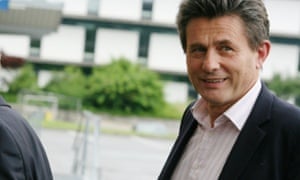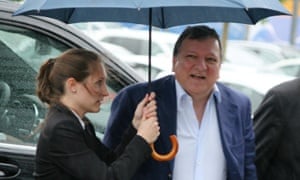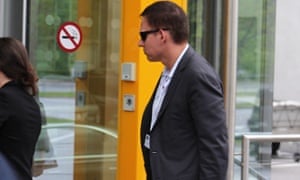Bilderberg looks to the future but is stuck in the past
Monday 15 June 201515.14
 Bilderberg has reached out to Silicon Valley; it’s even grappling with AI, but its media strategy and heavy-handed policing are from another era. The chairman of the Bilderberg Group, Henry de Castries, the head of AXA, decides whether or not to speak to the press. Photograph: Charlie Skelton for the Guardian
Bilderberg has reached out to Silicon Valley; it’s even grappling with AI, but its media strategy and heavy-handed policing are from another era. The chairman of the Bilderberg Group, Henry de Castries, the head of AXA, decides whether or not to speak to the press. Photograph: Charlie Skelton for the Guardian
Disturbing news has emerged that a bullet was fired at a police helicopter during this year’s
Bilderberg conference. Who would do such a thing? It turns out, the people who would do it are the police. The bullet was fired accidentally, admits a government spokesperson, by a member of Austria’s elite EKO Cobra counter-terrorism squad: the rifle went off when the officer was climbing into the helicopter.
Luckily, no one was hurt. One helicopter was slightly injured. That’s a relief, although it begs the question: what on earth is a crack anti-terror unit doing flying helicopter patrols around Telfs with live ammo and the safety off? Last time I looked we’re in the Tyrol, not Vietnam.
It seems appropriate that the single act of violence perpetrated towards police at Bilderberg 2015 was the direct result of their crazily heavy policing. In fact, the only injury the police received the entire time was when an officer sprained his lips from going “brrrm brrrm brrrm” while sitting in their redundant armored personnel carrier and pretending to drive it.
Photograph: Charlie Skelton/Guardian
An armoured personnel carrier sits in the woods during the Bilderberg conference. The police won’t spend money on a much-needed press accreditation centre here, but they’re happy to splash out on an armour-plated snowplough. What a joke.
In the wake of the conference, at the bar of the Interalpen-Hotel Tyrol, I chanced upon a lingering delegate, the Portuguese media mogul Francisco Pinto Balsemão. In my terrible Portuguese I asked him whether he’d had a productive conference – uma conferência útil – and he replied in English: “We always do.” I managed one more question before being bustled away by hotel staff. “Do you think next year you might hold a press conference, like in the old days?” Senhor Balsemão smiled, and replied in Portuguese. “Talvez,” he said. Perhaps.
He seemed a charming man, but tired. He was lingering, I suspect, because this was his last Bilderberg as a member of the steering committee, and he was savouring the memories of power. In the runup to this year’s conference, the Portuguese press had reported how Balsemão had nominated his fellow countryman, José Manuel Barroso, the former European commission president, to replace him on the steering committee. And midway through the proceedings, the official website was changed to show the switch in names.
After the conference, Barroso seemed jubilant. His grin spoke volumes as he sprang from his car at the airport. He beamed and waved at the cameras, and I thought for a moment he was going to punch the air like at the end of The Breakfast Club. He looked like the cat that got the cream, then decided the cream was boring, and drank a bottle of champagne instead.
José Manuel Barroso. Photograph: Charlie Skelton for the Guardian
Rather less forthcoming than Barroso was the investment banker James Wolfensohn. When asked by reporter Dan Dicks whether he’d had a good conference, Wolfensohn said: “I wasn’t there … I didn’t attend.” Which is a pretty rubbish answer to give to the press when you’ve just stepped out of a V12 Mercedes with a massive “B” sticker in the front window.
James Wolfensohn confronted at Bilderberg
Emerging from the next limo along, with a soft whir from its cyborg limbs, the remarkably lifelike Peter Thiel 3000 checked its scanners for threats, then made its way out towards its private jet.
Peter Thiel. Photograph: Charlie Skelton for the Guardian
The founder of Paypal and director of Facebook is currently pouring money into anti-ageing research, as part of his “immortality project”. He says: “I believe if we could enable people to live forever, we should do that. I think this is absolute.”
(Of course, he’s not the only Bilderberger with an eye on immortality. David Rockefeller, the godfather of the group, turned 100 during this year’s conference – it’s thought he joined the event via the huge screen they have set up in the main conference room. And Henry Kissinger is 92. He would have died years ago but Death is too scared to knock on his door.)
Back in 2006, Thiel was a co-founder, with Ray Kurzweil, of the Singularity Summit. Kurzweil is a famous futurologist, transhumanist and currently a director of engineering at Google.
By “singularity” is meant the shift towards smarter-than-human technology: the era of non-biological intelligence and, by extension, the merger of human and machine intelligence. Thiel’s ticket to immortality.
At Bilderberg this year, the executive chairman of Google, Eric Schmidt, brought along two of his top people to lead a session on AI. It might seem an odd fit for Bilderberg, but over the last few years the big shift within the group has been towards new media and new technology. Schmidt and Thiel both sit on the group’s steering committee, as does Craig Mundie of Microsoft and Alex Karp, the billionaire CEO of data analytics company Palantir, who was Thiel’s roommate at Stanford Law School.
Bilderberg has reached out to Silicon Valley; it’s grappling with AI. Looking forwards to the future, always with an eye to what’s valuable. If Bilderberg is to survive, and stay influential, it has to merge with this new technology. It knows it can’t be left behind.
And here’s where I worry for the future of Bilderberg. Inwardly, the group seems able to adapt to new technology, but what about the relationship between the group and the technology being used by the news media? It’s not the 1950s any more: you can’t just “have a quiet word” with half a dozen editors and keep a story out of the papers. You’ve got to deal with reporters like Dan Dicks and Luke Rudkowski, with their instant uploads and cameras hanging off every rucksack strap. You’ve got bloggers and citizen journalists, activists with Instagram accounts. News articles with comments sections and buttons to share them on social media. The news just doesn’t work the way it used to.
Thiel will tell you that, if no one else does.
Equally anachronistic is the heavy-handed policing: the checkpoints, the armoured snowploughs, the harassment, the helicopter patrols with itchy-fingered cops. The obstinate refusal to engage in proper press relations. It’s just a physical extension of Wolfensohn’s “I wasn’t there … I didn’t attend”. A denial of reality, a denial of change: and it’s no kind of long-term strategy.
It’s like George Osborne keeping his head down, dodging the cameras, and half-pretending he’s not been at Bilderberg, then eventually declaring the three days of meetings in his transparency data with the two words: “general discussion”.
More is required of Osborne, and more is required of the group in general. For its own sake as much as ours. So will the Bilderberg group take a deep breath, move forwards, and give us more in 2016?
In the words of Senhor Balsemão … talvez?
----------------------------------------------------
Kommentar:
Administrator
THE OTIUM POST




No comments:
Post a Comment
Enter your comments here: